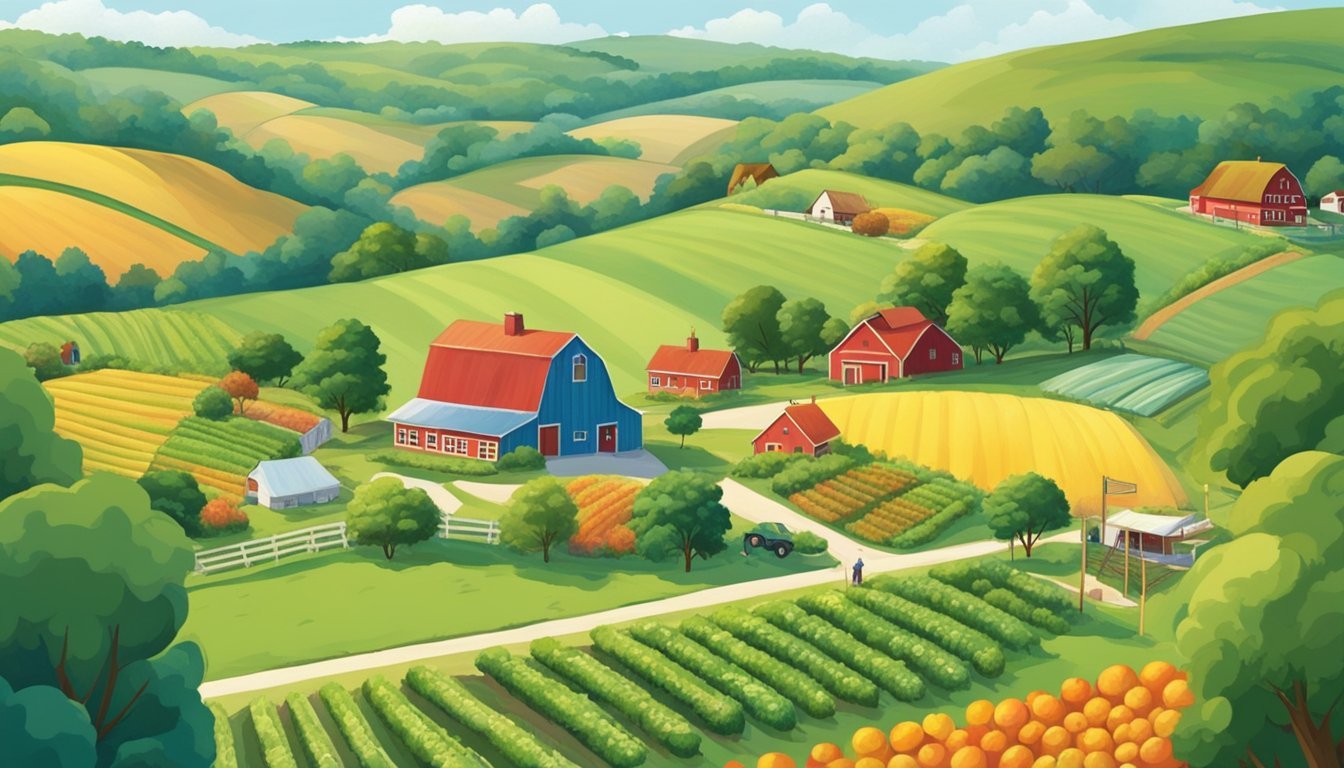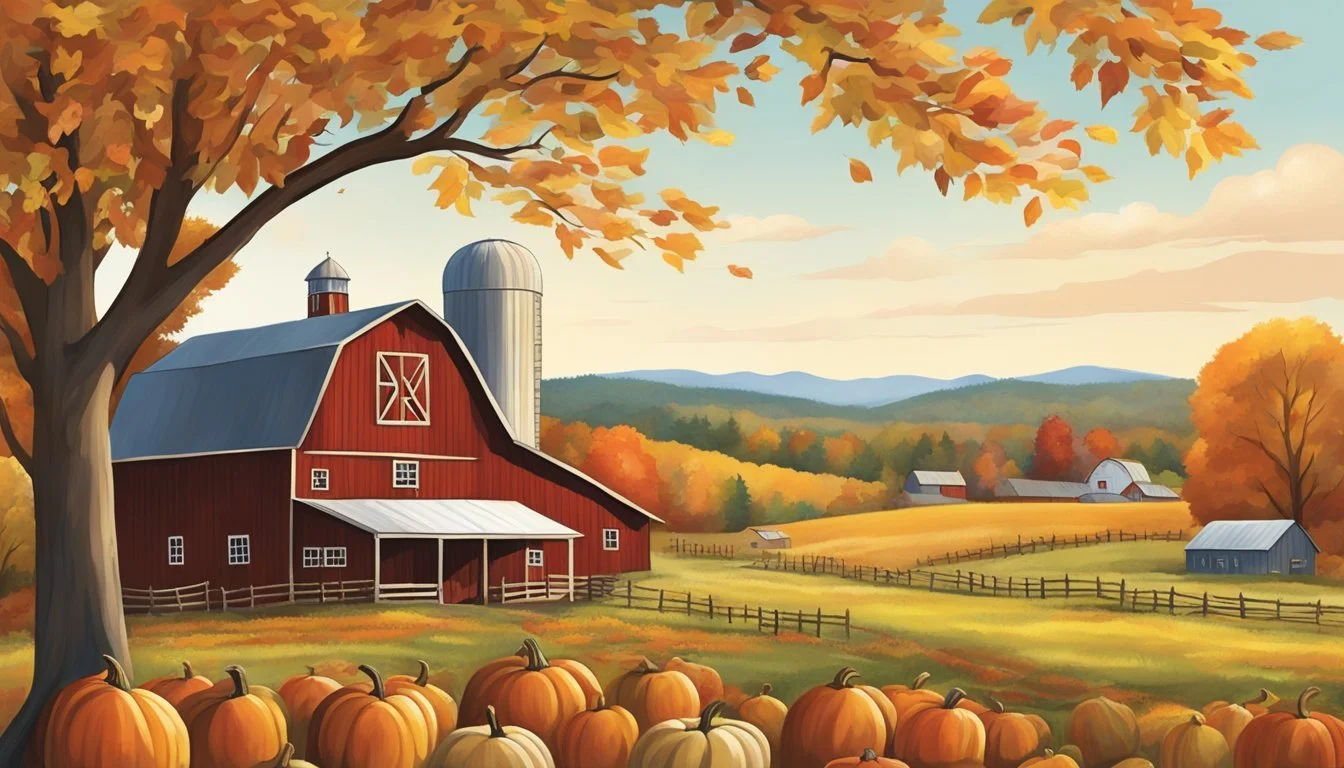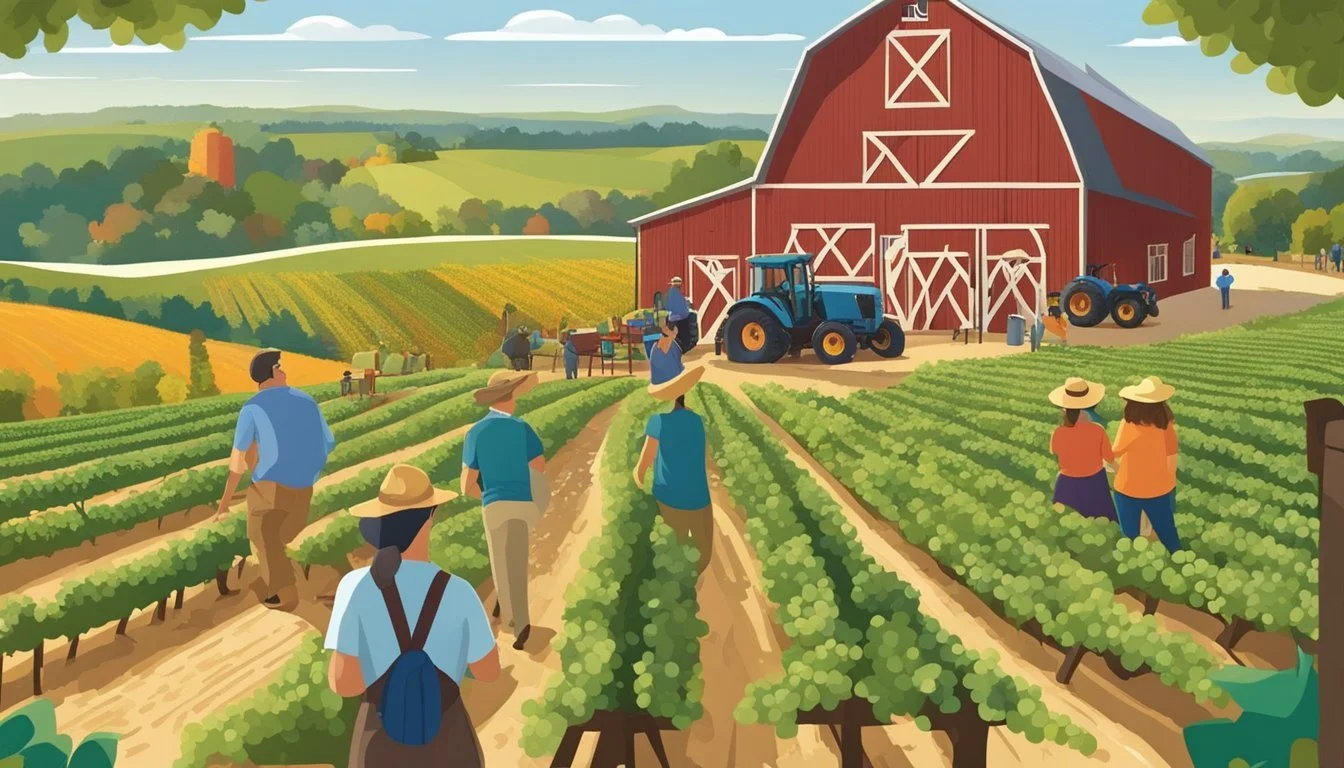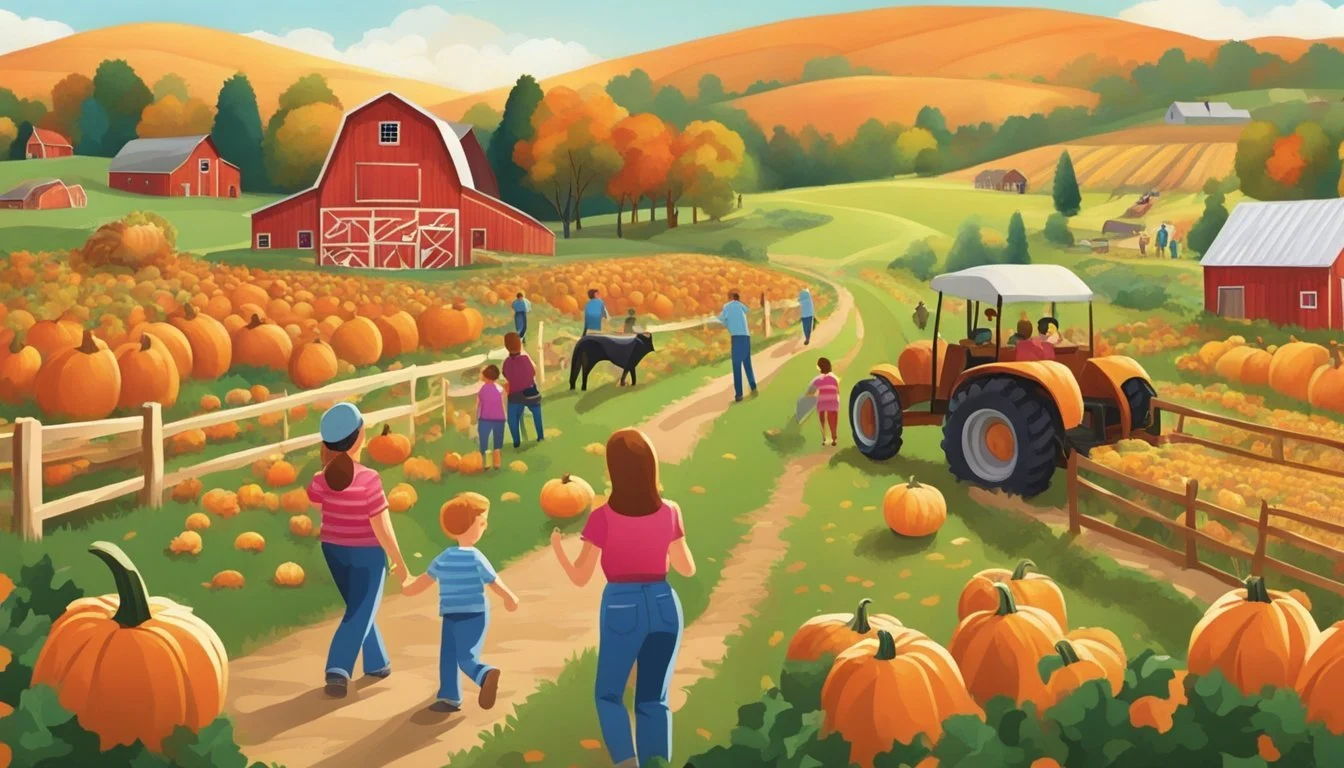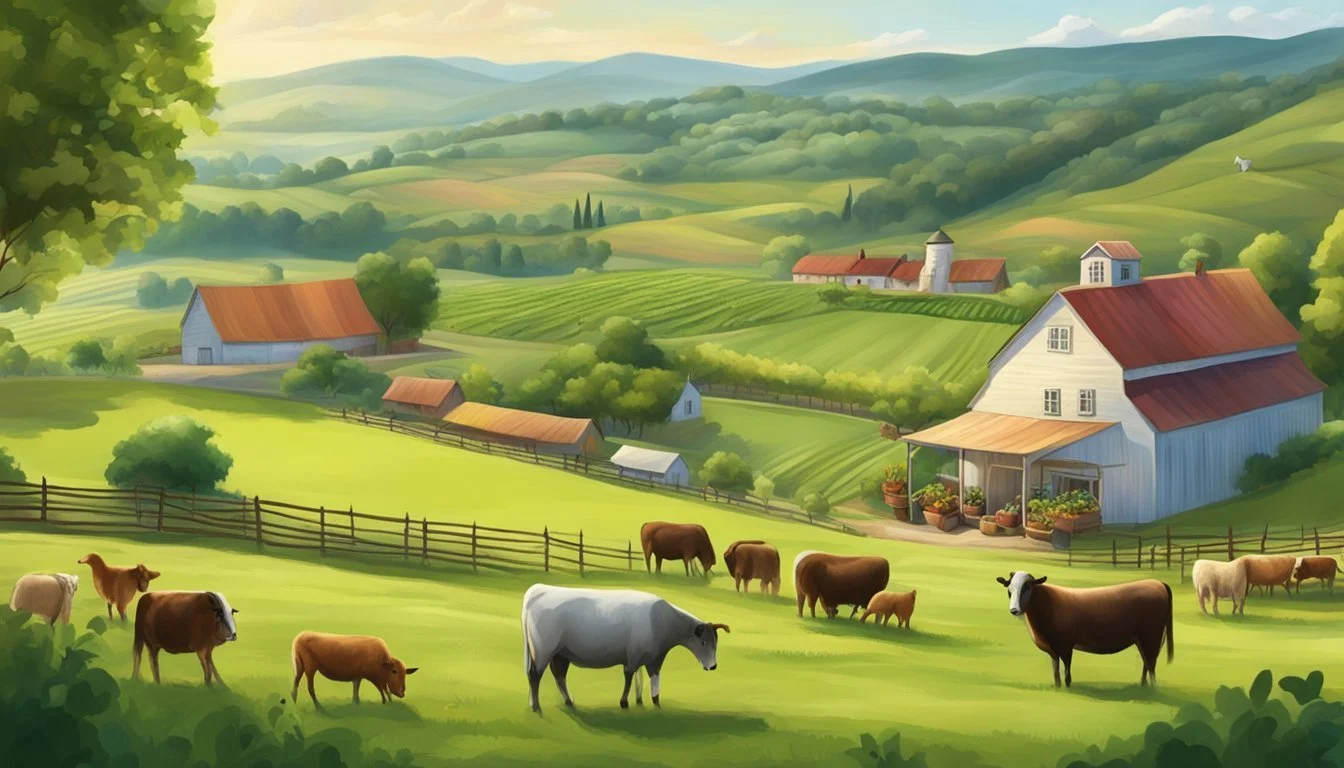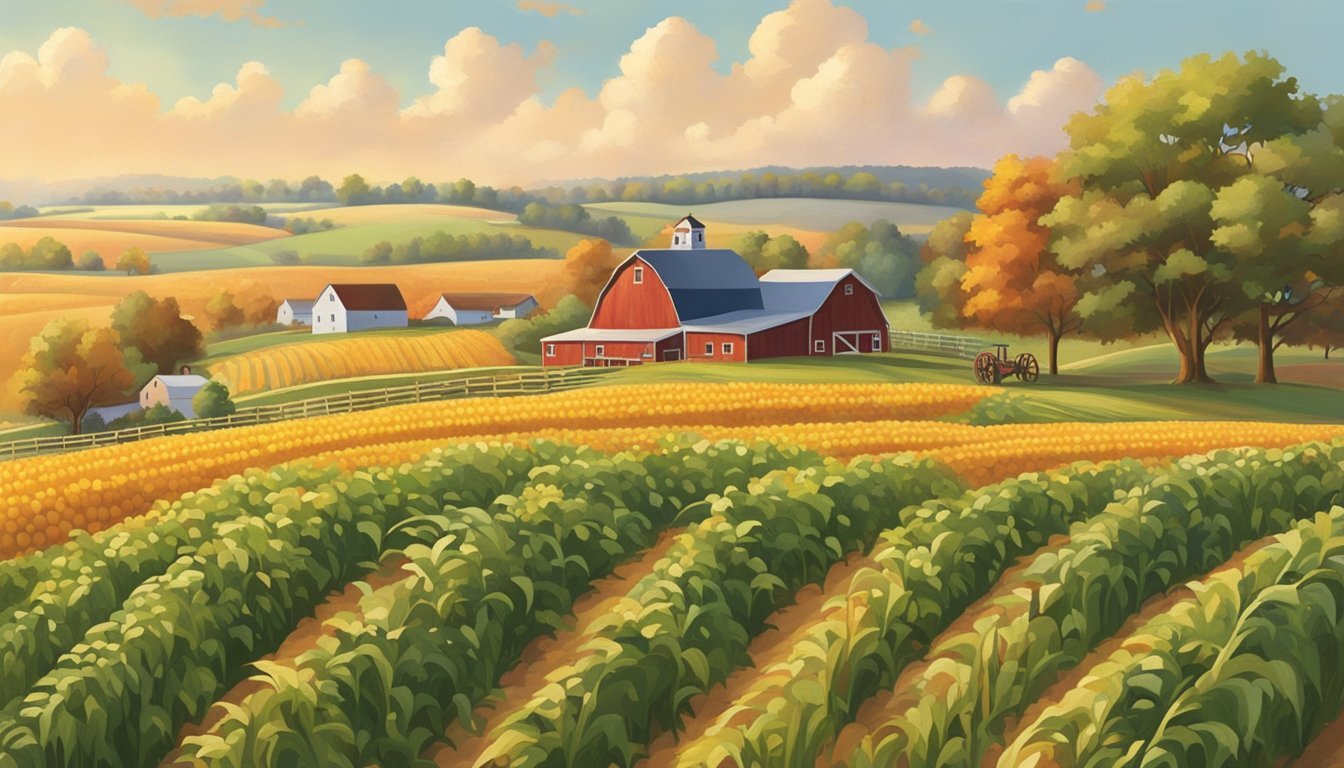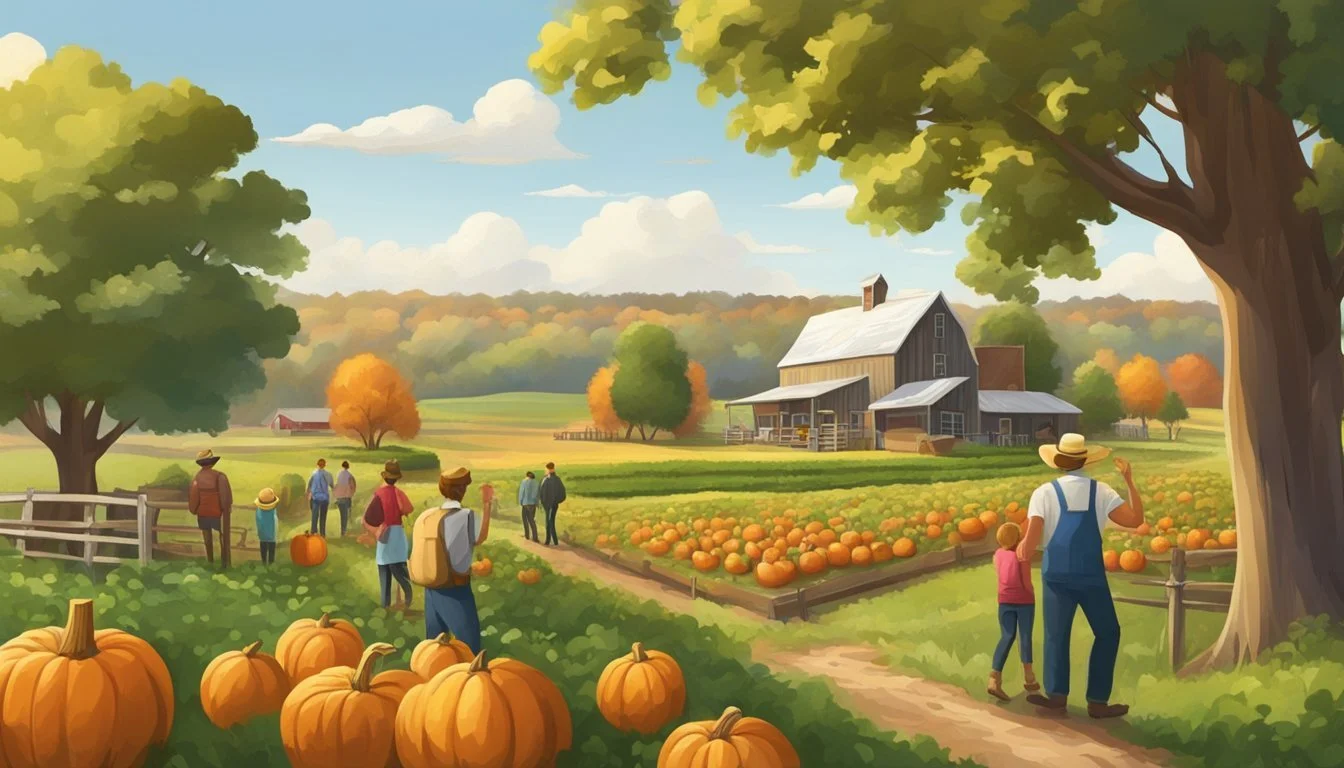Agritourism in Indiana
Exploring the Hoosier Heartland's Rural Charms
Indiana has emerged as a bustling hub of agritourism, offering a vivid tapestry of rural experiences that attract visitors from near and far. Agritourism is an industry that marries agriculture and tourism, providing an educational and entertaining experience that showcases the richness of farm life and food production. The state boasts nearly 300 agritourism destinations, allowing visitors to engage with a variety of activities ranging from U-Pick orchards, farm markets, and educational tours, to vineyard visits and Christmas tree farms.
The landscape of Indiana agritourism is diverse, with visitors able to partake in hands-on experiences like pumpkin picking, navigating corn mazes, or engaging with animals at petting zoos. Agricultural education is also a significant component, with many farms offering demonstrations that provide insight into the workings of Indiana’s agricultural heritage. These experiences not only foster appreciation for the state's agricultural sector but also contribute to the economy by supporting local farmers and producers.
What makes Indiana's approach to agritourism resonate with visitors is the combination of authentic agricultural involvement and the opportunity to create lasting memories. Tourists may find themselves savoring the freshest produce directly from the source, participating in seasonal festivities, or even relaxing in rural B&Bs that offer serene countryside views. Each visit encourages a deeper understanding of where food comes from while highlighting the importance of sustaining local agriculture.
History of Agritourism in Indiana
Agritourism in Indiana has deep roots, intertwining the state's robust agricultural heritage with an evolving tourism sector. This section explores the emergence and expansion of Indiana's agritourism from its historical origins to its current state as a significant contributor to the rural economy and educational landscape.
Hoosier Heritage in Agriculture
Indiana's agricultural history dates back to the state's early settlement, where farming played a critical role in the survival and economic foundation of Hoosier communities. Agriculture has always been at the heart of Indiana's identity, with a diverse array of crops and livestock shaping the Hoosier landscape. The state's agrarian history laid a fertile groundwork for introducing the public to the importance of agriculture through hands-on experiences and participatory activities.
Development of Indiana Agritourism
The agrarian industry began to harness Indiana's rich farming legacy, developing agrarian education and activities into an organized agrarian tourism industry. Recognizing the potential, the Indiana General Assembly legislated a definition for agritourism in 2011, encouraging farmers to invite the public onto their lands for educational and recreational purposes. This initiative paved the way for the growth of nearly 300 agritourism destinations in Indiana. These destinations range from farm tours, U-Picks, and farm markets to more involved experiences like wine and brewery tastings, all designed to educate visitors on the workings of a farm, enhance the heritage education, and contribute to the state's economy.
Key Agritourism Destinations
Indiana offers an array of agritourism destinations that cater to families, individuals, and consumers interested in agriculture. These locations provide unique experiences that connect the public with rural life and farming traditions.
Fair Oaks Farms
Fair Oaks Farms is recognized as a premier agritourism destination in the Midwest. It not only offers a chance to understand the farming process but also provides various events spaces suitable for hosting several types of gatherings. With world-class catering, visitors experience the farm life at its finest alongside modern amenities.
Tuttle Orchards
At Tuttle Orchards, guests are encouraged to engage with the workings of an actual farm. The orchard facilitates a range of activities from picking fresh produce to enjoying seasonal events that are particularly enjoyed by family groups. Their farm-to-table approach provides an authentic experience of Indiana's agricultural heritage.
Prophetstown State Park
Located near the town of Battle Ground, Prophetstown State Park integrates natural beauty with historical farming methods. This park is notable for its interactive exhibits and walking tours that educate visitors about the state's indigenous history and farming practices. Families and consumers alike can immerse themselves in Prophetstown's vast outdoor recreational activities.
Seasonal Experiences
Indiana’s agritourism thrives all year with distinct seasonal experiences that transform with the calendar. Each season offers its own charm, beckoning visitors for interactive and festive farm activities.
Corn Mazes and Pumpkin Patches
In the fall, Indiana's farms invite visitors to navigate corn mazes and select the perfect pumpkin from the pumpkin patch. These labyrinths are crafted with precision each year, providing an enjoyable and often educational experience as they often feature unique themes and designs.
Knollbrook Farm: Known for festive fall activities.
Corn maze available: Yes
Pumpkin patch available: Yes
Additional Activities: Hayrides
Christmas Tree Farms
During the holiday season, Christmas tree farms across Indiana come alive, offering families the opportunity to pick and cut their own trees. It's a time-honored tradition that combines the joy of the holidays with the beauty of Indiana's countryside.
Holiday Farms to Visit:
Santa's Spruce Christmas Tree Farm: Offers a variety of tree species.
Evergreen Valley Christmas Trees: Festive events and decorations.
Summer and Harvest Festivals
Summertime and harvest periods in Indiana are filled with festivals that showcase the state's rich agricultural heritage. These festivals often provide insight into farm operations, local food, and celebrate the season's bounty.
Popular Festivals:
Blueberry Festival: Celebrates summer fruit harvest with local produce.
Apple Fest: A fall celebration marking the apple harvest, featuring U-Pick orchards.
Agricultural Practices and Educational Tours
Indiana's agritourism blends agricultural activities with learning experiences, inviting visitors to engage directly with farming practices. Participants of agritourism can expect to gain a better understanding of the state's agriculture through various interactive and educational tours.
Educational Farm Tours
Educational farm tours in Indiana offer participants a first-hand glimpse into the workings of a farm. Visitors can learn about:
Crop Management: Understanding the cycle from planting to harvest.
Livestock Care: Gaining insights into the daily care of farm animals.
Harvest Techniques: Observing how various crops are harvested and prepared for market.
Tours can be tailored for a variety of audiences, from school groups looking to supplement their curriculum to adults interested in where their food comes from.
Sustainable Agriculture and Technology
Agritourism doesn't just showcase traditional farming methods; it also demonstrates advancements in sustainable agriculture and technology. Key elements include:
Innovative Farming Equipment: Showcasing the latest in agricultural machinery.
Eco-friendly Techniques: Teaching about soil conservation, water management, and organic farming.
Renewable Energy: Exploring the use of wind, solar, and bioenergy in farming operations.
Sustainable agricultural practices not only support the health of the environment but also ensure the longevity and productivity of farming as a business. Through educational tours, visitors gain insight into the evolving landscape of modern agriculture.
Local Cuisine and Farm-to-Table Dining
Indiana's local cuisine scene prides itself on a strong tradition of farm-to-table dining. This approach ensures that visitors not only enjoy fresh, locally sourced ingredients but also experience the true essence of Hoosier hospitality.
Farm-to-Table Restaurants
Chefs across Indiana are committed to collaborating with local farmers, championing the state's agricultural bounty. Restaurants such as the one run by chef Lindsay Dingman Baker in Converse epitomize this philosophy, providing farm-to-fork experiences that highlight pork, poultry, and produce sourced directly from Indiana's heartland. Patrons can anticipate menus that vary with the seasons and dishes crafted to showcase the flavor of the freshest ingredients available.
Noteworthy Farm-to-Table Spots:
Converse: Chef Baker’s establishment with a mission for local sourcing.
Other Locales: Eight acclaimed farmhouse dining rooms across the state.
Breweries and Wineries
Indiana also boasts a robust selection of breweries and wineries that incorporate local flavors and ingredients into their craft beverages. The trend of agritourism extends to these establishments, where visitors can often tour the facilities, learn about production methods, and taste unique beverages that reflect the regional terroir.
Breweries & Wineries Guide:
Experience: Tours and tastings that reflect Indiana’s agricultural heritage.
Products: A variety of local brews and wines, with a focus on quality and craftsmanship.
Both categories afford an immersive experience into Indiana's gastronomic culture, promising both education and enjoyment for those exploring what the Hoosier state's soil and souls have to offer.
Economic Impact of Agritourism
Agritourism presents a valuable opportunity for rural economic reinforcement in Indiana. It brings about a twofold benefit: preserving agricultural lands and boosting income for farmers by diversifying their revenue streams. In areas experiencing rural population decline, agritourism serves as an economic catalyst by creating jobs and fostering local business growth.
Farmers in Indiana have embraced agritourism, transforming their farms into destinations that offer a multitude of activities from fruit picking to educational farm tours. These experiences attract urban residents to rural areas, generating an influx of visitors which in turn supports local economies.
The following points highlight agritourism's positive economic contributions:
Job Creation: Direct employment opportunities arise on farms and indirectly in supporting industries such as food service and retail.
Local Business Ventures: New markets for crafts, food products, and other farm-related items flourish, drawing in local entrepreneurship.
Visitor Spending: Tourists contribute to the local economy through expenditures on activities, accommodations, and eateries.
Farm Income: Diversification into agritourism activities helps cushion farmers from the uncertainties of crop production and fluctuating market prices.
One specific example is Beasley's Orchard near Danville, which has reported an increase in visitors during events like the annual Heartland Apple Festival. Such events are indicative of the potential for agritourism to reshape the economic landscape of Indiana's rural communities.
Planning Your Agritourism Visit
When planning an agritourism visit in Indiana, one must consider both accommodations and weather to ensure a smooth and enjoyable experience. The state offers a variety of agritourism destinations and activities year-round, and preparation is key for a successful trip.
Accommodations and Reservations
Prospective visitors should book accommodations well in advance, as agritourism spots can fill up quickly, especially in peak seasons. Options vary from:
On-site lodging at farms
Nearby hotels
Bed and breakfast establishments
It's recommendable to confirm reservations for special events or activities such as guided farm tours, U-Pick experiences, or culinary events tied to the agritourism sites.
Weather Considerations
Indiana's weather can impact agritourism activities, so visitors should check forecasts ahead of time for the area they plan to visit. Key points include:
Dressing in layers or bringing rain gear if necessary
Noting seasonal variations, like warmer summers and cold, snowy winters
Outdoor activities like corn mazes or harvest festivals might be affected by rainfall or extreme temperatures, so having a flexible schedule and alternative plans is advisable.
Agritourism Activities
Indiana's agritourism is marked by a diverse range of hands-on experiences and events that engage visitors in authentic farm life. It provides an opportunity to explore the ins and outs of agriculture through various family farms and event spaces.
Hands-On Farm Experiences
U-Pick Operations: Visitors can enjoy the freshness of Indiana's produce by picking their own fruits and vegetables at local farms, including apples, pumpkins, and berries.
Educational Tours: Farms offer educational tours that allow visitors to learn about agricultural practices and the importance of sustainable farming.
Farm Animal Interaction: Experiences such as petting zoos and the Pig Adventure give guests a chance to engage with farm animals up-close.
Farm Markets and Roadside Stands: These venues display the abundance of local agriculture where visitors can purchase freshly harvested goods.
Special Events and Engagements
Pumpkin Patches and Corn Mazes: Seasonal activities like visiting pumpkin patches in the fall and navigating through corn mazes offer interactive fun.
Festival and Apple Orchards: Events such as the annual Heartland Apple Festival at Beasley's Orchard celebrate local produce and bring communities together.
Christmas Tree Farms: Families can engage in the tradition of selecting and cutting their own Christmas trees at various farms across Indiana.
Living History Farms: They provide a space for visitors to immerse in agricultural history and understand the evolution of farming practices.
Support for Local Producers
Indiana's agritourism sector offers robust support to local agricultural producers, enhancing their visibility and sales through direct consumer engagement. Here, farmers find new avenues to market their produce and connect with the community.
Farmers Markets and Direct Sales
Farmers markets serve as critical platforms for Indiana producers to sell their products directly to consumers. This direct sales approach benefits both farmers and buyers as it reduces the supply chain, ensuring fresher produce and a fair price for both parties. The philosophy in Indiana actively encourages consumption of locally-sourced goods, thereby keeping the revenue within the community.
Location & Variety: The state boasts a vibrant network of farmers markets offering a wide range of agricultural products.
Economic Impact: Sales at these markets not only generate income for farmers but also boost the local economy by keeping money within local circuits.
Agricultural Support Organizations
A variety of agricultural support organizations in Indiana offer resources and guidance to producers engaging in agritourism. They provide a framework that helps producers navigate the complexities of the agritourism business model, from regulatory adherence to business development strategies.
Training & Development: Organizations deliver specialized training programs for farmers, enhancing their capabilities to host agritourism experiences such as U-Pick activities, farm tours, and educational workshops.
Sustainability & Advocacy: These entities advocate for policies that support the growth of agritourism and help farms adopt sustainable practices.
Conservation and Climate Awareness
In Indiana, agritourism is enhancing visitor knowledge on sustainable agriculture while highlighting its importance in climate health. These operations are pivotal in showing how agricultural practices impact climate change and soil conservation.
Environmental Education
Agritourism destinations across Indiana serve as platforms for environmental education, where visitors learn about the state's efforts to conserve nature and mitigate the effects of climate change. These venues educate the public on sustainable farming practices, such as no-till farming and cover cropping, which play a vital role in reducing soil erosion and improving soil health.
Educational Opportunities Provided:
Farm tours demonstrating conservation techniques
U-Pick events that stress the importance of soil management
Workshops at farm markets on sustainable agriculture
Agriculture's Role in Climate
Agriculture in Indiana is intricately linked to climate, with farmers adopting climate-smart strategies. These include cover cropping and no-till practices, which not only protect against erosion but also enhance the resilience of farmland to climate variations.
Climate-Smart Practices:
No-Till Farming: Limits soil disturbance, preserves carbon in the soil
Cover Crops: Prevent soil erosion, improve biodiversity, and increase soil organic matter
The award-winning Chalfant Family Farms exemplifies how farmers can integrate conservation efforts into their operations, earning accolades like the 2020 Conservation Farmer of the Year for their commitment to these practices. These initiatives, in concert with the goals of the Indiana Conservation Partnership, underscore the agricultural sector's proactive role in fostering a climate-conscious future.
Regional Highlights
Indiana's agritourism is a testament to the state's rich agricultural heritage and the innovative spirit of its farmers. The state offers a range of experiences that bring visitors closer to the source of their food and the beauty of the rural landscape.
Northwest Indiana
In the northwest, the corn fields reign supreme, reflecting the region's strong affiliation with Midwest farming traditions. Agritourism enthusiasts often find themselves on educational tours that showcase modern farming techniques intertwined with sustainable practices. Greenfield farms, although not situated in the northwest region, set an example with events that allow visitors to engage directly with the agricultural community.
U-Picks: Fruit and vegetable picking opportunities abound.
Educational Tours: Insight into state-of-the-art farming technologies.
Southern Indiana
Venturing down to Southern Indiana, farms diversify with a mix of traditional agriculture and unique agritourism offerings. Scottsburg, known for its inviting community, features farm markets that highlight the region's produce, from fresh fruits and vegetables to handcrafted local products. Southern Indiana's agritourism is characterized by:
Farm Markets: Display a variety of locally grown and crafted items.
Winery & Brewery Tours: Offer a taste of the region's craft beverages in scenic locations.
The offerings of these regions epitomize Indiana's commitment to celebrating and sharing its agricultural roots with the world.
Emerging Trends in Hoosier Agritourism
The landscape of agritourism in Indiana is marked by a steady growth trajectory. Hoosier State farmers are creatively diversifying their agritourism activities, increasing the appeal to a broad audience.
Innovative Engagement: Farms are integrating modern technology with traditional farming practices. This includes the use of augmented reality in educational farm tours and online platforms promoting U-Pick schedules. These tech-driven experiences cater to a generation that values both innovation and authenticity.
Themed Festivals: Seasonal and harvest festivals have become significant draws. The Heartland Apple Festival, for example, is a prominent annual event that attracts a wide array of visitors. These festivals highlight local produce and often feature music, crafts, and other family-friendly activities.
Educational Opportunities: Awareness about agricultural processes and food production is increasing. Farms host school groups and provide educational materials which underline the importance of farming in Indiana's culture and economy.
Diverse Activities: Indiana agritourism now encompasses a variety of activities ranging from the traditional, like farm markets and Christmas tree farms, to the more unique, such as flower farms and agricultural breweries and wineries.
Specialized Farm Experiences: Some agritourism ventures focus on specialized experiences. These include intimate farm-to-table dining events, which emphasize Indiana’s local foods and culinary specialties.
This expansion into diverse agritourism options reflects Indiana farmers' responsiveness to visitor interests and market trends. As a result, agritourism in Indiana is not only an avenue for economic diversification for farmers but also a cultural enrichment for visitors.
Unique Farm Stays and Accommodations
Visitors seeking an authentic connection to Indiana's agricultural roots have the opportunity to immerse themselves in the rural lifestyle through unique farm stays and accommodations. These offerings provide more than just a place to sleep; they connect guests with the land and local farming communities.
Indiana Homesteads
Heritage Farm in Flora, Indiana, stands out as a prime example of a traditional Indiana homestead offering a unique stay. Guests can engage in daily farm activities such as feeding alpacas and collecting eggs while enjoying the comforting embrace of the countryside. Rooms and amenities retain a rustic charm, ensuring an authentic farm experience.
Bed and Breakfasts on Farms
By transitioning traditional farms into bed and breakfast establishments, some Indiana farms blend agricultural life with modern comforts. At these farm-to-table B&Bs, guests not only rest well but also enjoy meals prepared with fresh produce directly sourced from the farm they reside on. A delightful highlight is the locally famous Luonna Lancaster, a renowned farmstead that promises a serene escape with the added pleasure of fresh, home-cooked meals.
Profiles in Indiana Agritourism
Indiana's agritourism landscape is enriched by innovative farm entrepreneurs and bolstered by educational support from entities such as Purdue University, providing visitors with unique farm experiences and valuable agricultural education.
Innovative Farm Entrepreneurs
Lauren Bobbitt represents the new wave of agritourism advocates. As an enterprising individual, she operates a farm that caters to the public with activities like U-Pick orchards and farm tours. Bobbitt's approach blends traditional farming with the hospitality sector, effectively bridging the urban-rural divide.
Kevin Howell is another standout in Indiana's agritourism industry. Howell's farm serves as a testament to the diversification and innovation in agritourism, offering visitors a variety of experiences from pumpkin patches in the fall to festive Christmas tree outings in winter. He emphasizes sustainable practices and education, making his farm a model for agritourism's role in ecological awareness.
Purdue University's Agricultural Programs
Purdue University plays a significant role in the development of Indiana's agritourism. Through its agricultural programs, Purdue provides research, support, and education, enhancing the practical knowledge of agritourism entrepreneurs.
Agricultural Extensions: These outreach efforts connect the university's research with the community, aiding farmers in agritourism enterprises.
Educational Resources: Purdue offers workshops and materials that help farmers integrate agritourism into their business models.
By contributing academic expertise and support, Purdue University solidifies Indiana's standing in the national agritourism scene, ensuring that the state's farmers are well-equipped to offer enriched experiences to the public.
Agritourism in the Community
Agritourism in Indiana fosters strong community bonds and contributes to local food security by transforming the relationship between agriculture and the public.
Community Engagement and Partnerships
Community engagement is central to the success of agritourism in Indiana. Farms collaborate with local schools, businesses, and non-profit organizations to provide educational tours that spotlight agricultural practices and their significance to the economy. Such interaction encourages support for local producers and creates a symbiotic relationship where both parties benefit. For instance, on-farm farmers' markets not only serve as a platform for farmers to sell their products but also act as a gathering place for residents, enhancing community cohesion.
Key Partnerships:
Local Schools - for field trips and educational programs
Businesses - sponsorship for events like hayrides and corn mazes
Non-profits - advocating for sustainable agriculture
Agritourism and Local Food Security
The role of agritourism in bolstering local food security is noteworthy. By engaging in U-Pick operations and purchasing from roadside stands, consumers have direct access to fresh, local produce, which reduces the gap between farm to fork. These interactions have ripple effects: they increase awareness of local agriculture and often result in a commitment to buy local. Such commitments not only support the livelihood of farmers but also ensure that the community has a fresh and reliable source of food.
Food Security Contributions:
Direct access to nutritious produce for consumers
Educational opportunities highlighting the importance of local food systems


